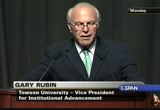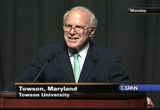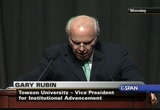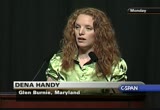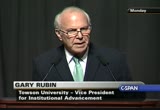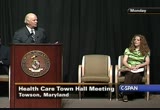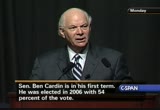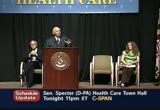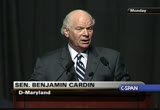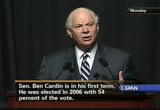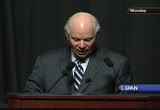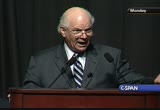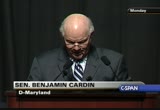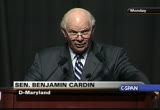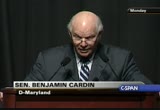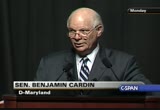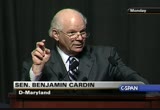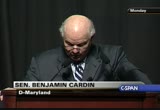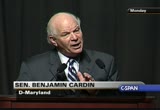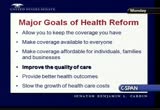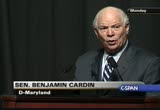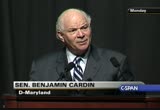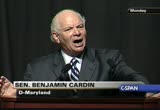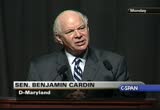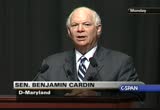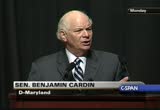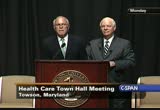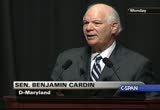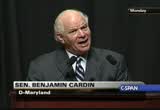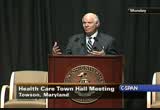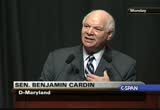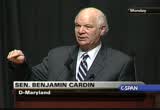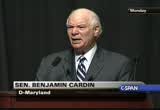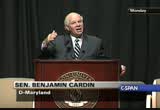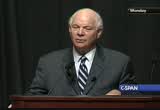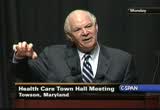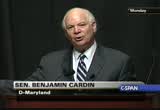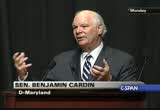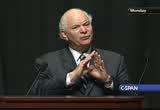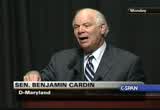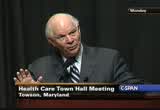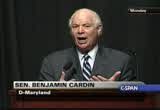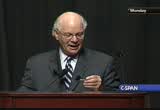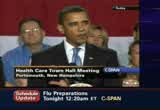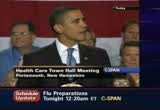tv Tonight From Washington CSPAN August 11, 2009 8:00pm-11:00pm EDT
8:01 pm
8:02 pm
vice president for university advance:i'm pleased to welcome you to maryland's metropolitan university, a university with over 21,000 students. while we have 6,20 200 graduates and 43 graduate programs relative to this topic tonight, in the health topic, we offer 13 programs, including nursing, speak language pathology, allied health, to name a few. towson university is the second largest producers of nurses in maryland and we have the largest undergraduate nursing program in the state. on stage with me this evening is u.s. senator benjamin cardin. [applause] and miss dina handy. we also have some elected officials that i'd like to recognize -- and i'd like to recognize them at this time. senator janice bicaanni,
8:03 pm
delegate adrian jones, delegate steve lafferty, delegate joseph bodner. bodner, delegate john cluster, delegate bill frank, rick empowerellaria, and a representative from senator barbara mikulski's office. "bro [booing] >> i see we have our favorites. diana turner, and delegates representing mayor sheila dixon. [booing] >> the topic of tonight's discussion, as you all know, is health care reform, a topic that has energized the public on both sides of the issue. as you can see from the turnout this evening. let me just say this, this is a town hall meeting. it is a chance to hear the surrounding health care reform
8:04 pm
and to ask and answer questions. all of us here tonight -- those of us on stage and in the audience -- all have our thoughts and concerns about health care and how it will affect us. that's why we're all here. so i hope and i know that throughout this evening, we will all demonstrate respect for each other and allow for a very robust discussion in the time that we are allowed. before we get started, i would like to go over the agenda and the rules for this evening so everyone knows where we're going in this next hour or so. the agenda will begin with miss handy, who will share her own personal story and relate her experience with the present health care system. then i will introduce -- [booing] >> then i will introduce u.s. senator ben cardin, who will walk us through the goals for health care reform as well as the staff us and proposed legislation working through
8:05 pm
congress. after senator cardin's presentation, senator cardin will respond to a few of 9 of te questions that some of you posted on cards that you received when you entered the theater. then the senator will take -- then the senator will take, after those questions, the senator will take questions from the audience from the two microphones set in the aisles. so that we get through as many questions as possible, as many as possible in our allotted time, audience participants will be asked to present questions quickly and not make statements. at this time, i would like to welcome miss dina handy to the podium. [applause] >> a few months ago, i sent a letter to senator cardin and other federal and state government officials to challenge them to find health insurance for my daughter, sarah grace.
8:06 pm
[no audio] sarah was born with a rare genetic disorder called lukeric aceltaria, or g-1. this disorder affects her ma to be lymph and how her -- metabolism and how her body breaks down protein. a person with this is at risk for a stroke every time they are ill, especially with a fever or vomiting. sarah suffered just this kind of a stroke when they was five months old, which left her with cerebral palsy. now at the age of three, she cannot sit, stand, walk or talk. despite her physical limitations, she has proven to be intellectually intact. she knows colors, shapes, some letters and numbers, she can sort. she loves books and to play with her two older sisters. sarah had been on state medical assistance in the rare and expensive management program.
8:07 pm
with this insurance, we were able to get her care which was denied her through her prior insurance, a wheelchair and a prone stander, all necessary and necessary expandable pieces of durable medical equipment. earlier this year, we received notice that sarah was no longer eligible for assistance because our income had increased due to an increase in income from my husband. this is when we started on get nervous. we cannot afford tore sarah grace to have insurance. due to her disorder and cerebral palsy, she is on a feeding tube, requires special formula, medication, frequent doctor visits, and frequent hospitalizations. all of these unique everyday challenges add up to a costly medical condition for our precious little girl. just her medications, formula and feeding supplies for one
8:08 pm
month, the cost would be approximately $800 without insurance. not to mention that the nurse that usually comes out to our house once a month to access sarah's infusa-port would not come if she was not insured. we attempted to have sarah placed on our private insurance but she was denied because of her preexisting condition. we then fought for two months to get her insurance through the maryland health insurance plan, or mhip. it is important to note that sarah could not have a lapse of insurance because then she would have been uninsurable for six months. mhip is a state insurance health insurance program for maryland residents who have been unable to obtain health insurance from other sources. at the time of our original application, sarah was two. she was denied mhip because the state said she was eligible for medicare.
8:09 pm
did i mention she was two, not 62? so i spent an afternoon along with sarah at the social security administration to get a letter from them stating that she was not eligible for medicare. even after receiving this lett letter, mhip denied her again, still saying she was eligible for medicare. it wasn't until i started sending letters to government officials that i saw some progress being made. it is heartbreaking for me that because we now make a little bit more money, our daughter may no longer be well insured. my husband works two jobs in order for us to make ends meet. we are fearful for our financial situation and the burden her medical costs will put on us. we are challenged to give adequate medical care to sarah without going bankrupt or having to sell our house. i can understand how this situation can really cause many families to try unethical or untraditional solutions to this insurance challenge. it seems this is one of those
8:10 pm
catch-22 situations that helps me understand why some people stay on welfare. why should they want to do better for themselves if they can get more by doing less? there has to be a better answer out there, and if there are already answers out there, we need to make them easier for those who need it. sarah grace is now insured through mhip. after two months of extreme financial and emotional stress, we received her insurance card the first week of july. we are now working on placing sarah grace on the model waiver list because although mhip is better than their insurance, it is not adequate for all of sarah's medical needs. i won't pretend that i know all the ins and outs of all that is going on in the debate over health care reform or that i even agree with it. but i do know there needs to be revisions to the current system. because of my daughter, i know i need to become more informed and this town hall meeting is one way of doing so. thank you, senator cardin, for inviting me to share sarah
8:11 pm
grace's story. i hope that her story will benefit anyone who finds themselves in a similar situation. [applause] >> thank you for sharing your own personal story and sharing that with us. it is now my pleasure to introduce senator benjamin cardin. but let me just mention a couple of points about senator cardin. in more than 20 years in the u.s. congress, senator ben cardin has become a national leader on health care, retirement security, the environment, and homeland security and fiscal issues. from 1987-2006, he represented maryland's 3rd congressional district in the house of representatives. he was elected to the senate in 2006, where he currently serves on the foreign relations, judiciary, environment and public works, budget, and small business committees. he has served as chairman on the commission on u.s. cooperate in europe, the u.s. helsinki commission. in the house, his proposal to
8:12 pm
expand medicare, and to include several screening tests was enacted into law. he has authorized legislation to fund graduate medical education, guarantee coverage for emergency services, and improve the medicare drug benefit for seniors. earlier this year, senator cardin was successful in getting a guaranteed dental benefit included in the reauthorization of the children's health insurance program. it is now my pleasure to introduce to you, senator benning main cardin. senator -- senator benjamin cardin. >> dr. rubin, thank you very much. and i do want to thank towson university for opening up this hall so i could have a town hall meeting. i dare say when i made this request several weeks ago, they did not know what they were getting themselves into, but i thank them very much for always being available to provide an opportunity for the community to
8:13 pm
get together. i also want to thank dena handy for being here. i do that because there are thousands of cases similar to dena's in our community. our health care system is complicated and doesn't respond well to individual family challenges. if dena had worked for a small company that had a health care plan for their employees and the insurance covered her daughter's condition, the small company may have been forced to give up their insurance because it would have been increased dramatically the following year because it's experience rated premium. small companies have a hard time finding large plans in order to join. if it were not for the state of maryland -- and i thank my colleagues in the maryland
8:14 pm
legislature -- in adopting a program to try to fill the gaps for the federal government act, you may still be uninsured today. so we want to be able to provide a system in which every person in this country has access to affordable quality care. we don't want to see any child in america denied necessary health care. so i thank you all for joining me at this town hall meeting. i have town hall meetings frequently. i was asked by a reporter before coming in here, "why did you do this? why don't you just do one of those go on the internet and have a chatroom or answer the calls? where did you want to have a town hall meeting?" and my answer is very simple. i do town hall meetings. i do other types because i want to give you an opportunity to ask questions. i want to be able to respond to your questions. health care reform is a very important issue, very important
8:15 pm
issue that affects everyone in our communities. and i want to make sure that you have the information before you. i was one who encouraged the leadership in congress to take its time so that we could have these types of discussions. [applause] at this moment, we don't have one bill. we have bills that have been reported out of committee. but what i want to do tonight is give you ample time to ask your questions. and my own request -- i only have one request -- is that you respect the people that are in this room. [applause] they waited a long time to get here in the room tonight and i think they have the right to be able to hear the questions and
8:16 pm
the answers. and the more time we spend on the questions and the answers, i think the more productive the evening will be. i'm going to be here until 8:30 answering questions and we'll do the best we can to have as many people as possible get their points across. let me start off by pointing out the obvious. president obama has made health care his top priority. he said this during the campaign and he's now started to act on it. so far this year, we have seen health care passed by the congress, the children's health insurance program was enacted into law covering another 4 million or 5 million children, including dental care for our children. [applause] the american recovery and reinvestment act was passed by congress. it includes a significant investment in our health care system. it provides cobra protection for
8:17 pm
those who lose their jobs so that they can continue their health insurance even though they may have lost their employment. it includes a significant amount of money in research -- for research for discovering the answers to many of the unknowns, including perhaps we hope one day, dena's child, to be able to find answers to these diseases. it includes a significant amount of money invested in health information technology so that we can get a better way of portability -- interportability among the different health care providers in our system. it provides a significant amount of money for prevention and wellness programs, a down payment on what we hope will occur through health care reform. the president also was successful in getting legislation passed that will regulate tab he counder the f.d.a. this will -- regulate tobacco under the f.d.a. this will at least give us the opportunity to try to deal with
8:18 pm
young people and smoking. so we have seen a focus health care reform and the major issues, of course, will be whether we will pass major health care reform this year. now, i want to start off with some of the basics so we all c can -- i want to make sure that everybody understands where we are today. [talking [and shouting] >> that's why we need reform. currently we have 177 million americans who have coverage through their employer or individual insurance protection. now, some of those are self-employed -- self-insured plans with large companies. others are commercial private insurance plans. the numbers, though, reflect a large number of people, 177 million, with private coverage through their
8:19 pm
employment. we are committed to making sure that those who are satisfied with their current insurance coverage are able to keep it. [talking and shouting] i think most people agree with that. [shouting] >> no, i think most people agree that you want to keep your private insurance. okay, i'll rephrase it. now, in medicare, medicare today covers 45 million americans under the medicare system. now, of the medicare system, 10 million are in private insurance plans. these are private insurance plans that write medicare. in traditional medicare, which is fee-for-service, run -- paid for by the public option medicare -- it's all paid for under the public option of medicare -- 34 million are in
8:20 pm
traditional fee-for-service medicare. of that amount, 24 million have some form of supplemental insurance. in many cases, these are retiree benefits that they have from work n. other cases, it's -- from work. in other cases, it's supplemental plans that they buy commercially. under the medicaid program and the children's health insurance program, which are government plans, another 40 million americans get their health care needs paid for. and then there's 47 million who are uninsured. 47 million. [shouting] >> that number has increased by 20% -- has increased by 20% in the last decade. the vast majority of the uninsured, the vast majority are younger workers, people who are working, in many cases they could buy health insurance, they
8:21 pm
choose not to today. these are young workers. maybe some are in your own family. in maryland, our numbers are slightly different and i want to point this out, because we have a different demographic than the national. our number in private insurance is similar, 3.6 million, to the national average, but the major difference is in medicare. we only have 48,000 that are in private plans in medicare. i want to repeat that because this is an important number. the maryland seniors and disabled who are qualified for medicare have chosen basically to stay in traditional medicare. they have not opted for the private insurance option that is available to them. the rest of the numbers are comparable in percentages to the national numbers. now, one of the reasons we're
8:22 pm
looking at health care reform is costs, so let me get to the costs today of what it costs to insure a family and an individual in today's market. in 1999, a family plan in america cost $5,700. that's what a family insurance plan cost. by 2008, ten years later, that plan cost over $12,000. that's an increase of over 100% in ten years. this is private insurance and the cost of private insurance. i think many of you have seen the consequences of this. employers have shifted costs over to the employee, where employees pay a larger percentage of the costs of their employer-provided health benefit. you've seen it in tougher rules to cover families where you
8:23 pm
work. they'll cover the worker but it's more expensive to cover your family. and we've seen it unfortunately happen with many companies choosing to eliminate their health insurance. what is really disturbing is what the scorekeepers tell us will happen to the cost of health care if we do nothing. if congress decides that this is too controversial of an issue to pass, it is projected -- [shouting] -- it is projected that health care costs will go up in ten years from $11,000 a family -- that's 2006 -- to over $23,000 a family by 2016. now, even if your employer covers a significant part of that cost, it affects your
8:24 pm
compensation. this is what you are paying for as a worker today for a family plan. now, health reform will provide more coverage, not less. let's talk about the facts. i know some of you don't want noticmeto mention the facts butn to the facts. today in maryland -- [shouting] >> -- in maryland, 71% of marylanders who have private insurance are in one or two private health insurance plans. we don't have much competition in private insurance in maryland. one-third of the employers offer no choic to their employees. none whatsoever. none oone of our objectives in h care reform is to give more
8:25 pm
competition and choice to bring down costs. [audience shouting and booing] >> the major vision for health care reform. now, i understand that many of you -- many of you really want to hear what's going on, so let me try to get through this. thank you. the goals of health care reform are to allow you to keep the coverage you have. now, look, there's no bill that says i can assure you, that the majority of members of congress will not pass a bill, nor will president obama sign a bill, that does not allow you to keep your insurance coverage. we do that -- we do that by
8:26 pm
stabilizing costs. if we don't stabilize costs, we will see an increase -- we will see an increase in the number of people who will lose their insurance. [audience shouting] >> the second goal of health care reform is to make coverage available to everyone. we want all families to have health insurance. now, the question might be ask asked: how do the 46 million without health insurance affect me? i have insurance, how does it affect me when 46 million americans do not have health insurance? now, the answer is simple. those who don't have health insurance use the health care
8:27 pm
system in a more costly way. they use the emergency room. they don't pay their bills. and it costs all of us money. today in maryland, every family that has health insurance is paying an extra $1,100 a year because of those who don't have health insurance. so one of our reasons for being concerned is to bring that to an end. it's wrong for those who have health insurance to have to pay for those who don't have health insurance, particularly in a more expensive way.
8:29 pm
8:30 pm
>> let me just complete these remarks. we want to provide better health outcomes and slow the growth of health care expenses. now, all of the proposals -- listen, i know a lot of you have your minds made up and i understand that. that's fine. but what i want you to know -- i want you to know what's in th the -- what's common to all of the proposals. so we can then, therefore, have a discussion. maybe you disagree with that. these provisions are in all of the health care reform proposal as that are working their way through congress. i think -- i think you're going to agree with some of these. first, insurance reform. insurance reform means that insurance companies today will no longer be able to discriminate on preexisting conditions. they will not be able to have exorbitant out-of-pocket expenses for copayments. no charge for preventive health
8:31 pm
care. no dropping of coverage of seriously ill. no gender discrimination. no annual caps. no lifetime caps. and there will be a guaranteed insurance program. that's included in all of the bills. included in all of the bills is individual responsibility. everyone will have to have health insurance and carry their own responsibility. that's in all of the proposals. in all of the proposals is employer responsibility, and we'll get to that in a few moments. employers have to help. in all of the proposals, you have a chance of plans, doctors and hospitals, that's maintained in every one of the bills that are moving through congress.
8:32 pm
in every one of the bills, we have a focus on prevention and chronic care, diseases. we want you to be able to -- [applause] -- >> we want you to be able to take care of your preventive care and wellness issues. in all of the proposals, we are going to lower u.s. health care costs or we're not going to pass a bill. [audience shouting] >> now, i only have -- i only have one more slide to go. [applause] >> and if i -- look, some of you -- all, again, i ask, is if you give people a chance to have their questions heard and give a chance for response, i think it might be a little bit easier. now, these are open issues.
8:33 pm
there are no decisions that have been made on the bills that have gone through congress to date. so we can't answer these questions on any definitive answer. your comments on this will be very helpful. we don't know what's going to happen with the public insurance plan. we do know that there will be exchanges where you'll be able to buy private insurance. we don't know whether we'll have a public insurance option or not. we can debate that issue tonight. i have strong views about it. you may have strong views about it. this issue's an open issue in washington. we have not yet decided employer responsibility. we want to make sure that small companies are not burdened by the health care reform. we want to help the small companies so there's going to be exemptions for small businesses and tax credits for small businesses. we don't know how we're going to pay for the costs in the short term. let me explain that. let me explain that so you'll
8:34 pm
understand. we have a common rule. there will be -- there will be a loss of revenue to the federal treasury because of the extension of tax relief to more people, as more people become insured, they use before-tax dollars. that costs revenue to the federal government. there will be investment in getting more primary care facilities because we'll have more people that will need primary care, and we're going to provide subsidies for low-wage workers and small businesses. all that costs revenue. how do we pay for it? we are committed to making sure that it's deficit-neutral. the budget requires it and i can tell you, we are not -- i'm not going to vote for a bill that's not paid for, so it's going to be paid for. [audience shouting] >> now, i'm going to tell you this. i am confident -- i am confident that we're going to get this right.
8:35 pm
i am. and that's a confidence in the american people. we're not there yet. we're not there yet. but i can tell you, those who are engaged in this discussion who are willing to look at the facts, are willing to look at the problems that we have in this country understand that our budget and our economy require us to bring in the costs of health care. we know that. if we're going to keep jobs in america, we need to be competitive. we've got to bring down the costs of health care. so we've got to get this right. the current status -- the current status is that more four committees in congress have passed bills. you can get information on those four bills. there is no bill yet on either the house or senate floor. there will be in the fall of this year. there's a fifth committee --
8:36 pm
there's a fifth committee, the senate finance committee. the senate finance committee is working over the august break to try it to resolv re -- to try to resolve differences. it's a bipartisan effort -- three democrats, three republicans. i certainly hope -- i certainly hope that we will have a bipartisan bill because i think we'll have a better bill. so my advice is to get engaged in the process but understand what is going on. my last point -- >> let the senator say his last thought and then we will go to the questions. >> my last point -- my last point is this. we are on the verge of taking up a significant health care reform bill. we want you to get the facts. unfortunately, many of the -- much of the information that's being presented there is taken
8:37 pm
from one of the bills or a misunderstanding of one of the bills, so i hope -- i hope you're willing to listen to the facts. i will do my best to leave the editorial comments out of answers if you will do the same in your questions. i think that will be of service to the majority of the people that are here that have sat through quietly as i was making my presentation waiting to hope to get some information. and with that, let me turn it over for the questions. [applause] >> we're now going to address the questions. each of you when you walked in tonight had an opportunity to write down a question on the card. some of you did. some of you did not. here are some of the questions. when we finish this set of questions, we will then go to the questions at the mike. okay? if you'll please respect the members of your audience that are sitting next to you who want to hear the question, we want to
8:38 pm
hear senator cardin address the question. again, we want statements -- we want questions, not statements. first question submitted: will illegal immigrants have access to health care under the new health plan? [audience shouting] >> the answer is no, they will not be covered under the bill. they will not be -- they will not be -- there -- i -- there will be specific language on this for the immigrants. those who are not lawfully in this country will not be entitled to any of the benefits of the bill that we're talking about. they will not be part of the universal system. they will be excluded entirely. >> second question. as a small business owner, i am very concerned about the cost of our insurance. it went up 15% last year, 26%
8:39 pm
this year, and will go up again next year. how will the proposed plan help us? >> small companies today are in plans that reflect the health experience of their employees. so if you have 50 employees and you get a -- a commercial health care plan, and first of all, your costs are going to be higher to start off with because you have a smaller plan. and then secondly, if a couple of year employees happen to have a bad experience with health care during the year, they adjust your premiums to reflect those claims, making it very difficult for small companies to plan a budget on health care costs that is such a large part of their expenses. so under the new plan -- under all of the new plans, the small companies will be in large poo pools. there will be no preexisting conditions. they will not be able -- the insurance companies will not be able to rate based upon the experience of the people in that group. they will have to use the broader community.
8:40 pm
that will make the rate very similar to a larger company, protecting small companies in their insurance plans. [applause] [audience shouting] >> these are your questions. question number three: do you support socialized medicine, and isn't that what this plan is ball? >> well, i'm a -- our current system is not socialized medicine. we do have public options in which the government collects the money and pays the private doctors and hospitals. i believe in private doctors and hospitals. i believe in diversity in our health care system. i do not believe in socialized medicine. i want an american health care system. i don't want to adopt the health care system from any other country. [applause] >> question number four before we go to the mikes: please explain how the senate plan saves money by implementing preventive care. >> well, preventive care -- let
8:41 pm
me just give you one example of managing care where we've seen tremendous savings of money. safeway -- you all know safeway. they have a program for a large number of their employees which is a voluntary program. if you enter this program and you assume responsibility for just four of your health care concerns, if you manage your heart situation, whether it's high blood pressure, cholesterol, or blood-thinning drugs, if you manage your diabetes so that you can prevent amputations and kidney problems, if you manage your weight and exercise by managing your own needs, and if you go through a smoking cessation program or you don't smoke, then safeway has guaranteed that your premiums will not be increased. and for four years, they've been able to keep costs constant by those four issues. wellness and prevention work. colon cancer can be prevented by colorectal examinations. they're expensive and they're not very nice and you have large
8:42 pm
copayments and deductibles, people are less likely to have these tests done because of that. so what we're trying to do is make -- we eliminate any copayment and deductions for these types of preventive tests where you can detect diseases, whether it's going to be breast cancer, colon cancer, prostate cancer, detect it early, prevent it, save money, save lives, make our system more cost-effective. [applause] >> we're now ready for questions from the audience. let me just make a couple of comments. again, one, please ask questions that have not been asked before. there are many concerns in this room. we want to try to handle and address as many questions as possible. there are two microphones in the aisles. you should get behind the microphones. again, we are looking for questions, not statements. you should ask your question quickly.
8:43 pm
we will not be entertaining lengthy statements. are those in the aisles ready for the first questioner? >> renee, first questioner over there? please get behind the microphones. [shouting] >> if will you get behind the microphones, we'll have more time to answer the questions. >> [audience shouting] >> renee, are we ready for the first question on your side? first questioner?
8:44 pm
>> senator cardin, one argument against the house health care reform bill is that there are so many nonhealth and noncatastrophic health concerns covered which will cost billions and billions of dollars. this includes, among other coverages, mental health coverage, covering all problems a person chooses to talk about with a mental health professional, as well as marriage counseling and other nonhealth concerns. how can you and democrats support such a costly, irresponsible national health care insurance? >> well, as far as -- [applause] >> what we are seeking, we're seeking one simple goal and that's parity between mental illness and other types of physical illnesses. we think it's wrong to discriminate against mental illness. we have for a long period of time. we've had higher deductibles and copayments. [applause] >> and we think that's wrong. it's not up to congress, in my view, to determine what is appropriate mental health services. to me, that's a professional
8:45 pm
judgment that needs to be made by the medical community. i don't want to substitute my judgment. but i want a person who needs mental health services to be able to get what is reasonably necessary and the health care professional should be reimbursed. >> senator, let me just say one follow-up, that is simply incorrect. if i see a psychiatrist because my life isn't going well and i'm unhappy, a psychiatrist can say, ah-ha, he has adjustment disorder and you'll be covering that as a medical disorder when it's not a medical disorder. why would you support that? [applause] >> well, i'm going to stick to my answer. i don't think you want -- i don't think you want elected officials making those types of medical judgments. it's not my job. it's unto the medical community. if the psychiatrist is giving -- if the psychiatrist is not giving the right advice, then there should be a way within our system to hold that psychiatrist liable. if it's fraud, let's go after
8:46 pm
the fraud. if it's abuse, let's go after it. but let's not deny people who may need mental health services because we're afraid of trying to find out the right answer to that question. >> let's have a question from this side of the room. first question? >> thanks for coming, senator. why isn't tort reform a part of any of these bills? [cheers and applause] [cheese and plawz] >applause]>> there's a second py question. there's a second part to my question. senator, does it have to do with that nearly half of the representatives in congress are lawyers?
8:47 pm
[applause] >> you know, i don't have to give my own background here but i think i will for one moment. i was speaker of the house when we passed the maryland tort reform bill. i chaired the conference committee as speaker of the house, which was a very unusual thing to do, to bring out the maryland tort reform caps on damages. so i understand the desirability of having a more efficient system. as relates to unnecessary tests. there are a lot of different parts to tort reform, including alternative dispute resolution, et cetera. i'm not certain we won't get to that in this bill. it may very well happen. so i think you should judge us based upon the final bill bill t moves through congress. >> next question from this side of the room. yes? >> senator, please allow me to
8:48 pm
also commend you for showing up and taking the heat. i didn't think that you had it in you. please allow me to ask you two very quick questions. the first one is a yes-or-no answer, please. and the second one is -- you're not going to be able to answer but i'll ask it anyway. please specifically state if you are willing to include yourself as well as other members of the house and senate in whatever bill that the congress, they pass, that you would be subject to all the laws and all the provisions of whatever the health care reform bill may be? that is a yes-or-no question. >> i'll answer the question. i first want to -- [cheers and applause] >> let the senator answer the question. >> it's a legitimate question. >> let the senator answer the question.
8:49 pm
>> first let me -- >let me answer the question, please. i'll save the humor for the next one. let me -- the answer is that congress, federal employees, all will be covered by the plan. you ask me personally, i happen to be a -- i turned 65 this year. i'm in a public plan. it's called medicare. >> all right, well, senator, thank you. as a follow-up, if i may, please, senator. >> well, i want to answer the question, though. i answered the question. we're going to be covered by it. we want to have the ability to have backup. we want people to stay in their private insurance. that's our goal. the congressional budget offic office -- >> all right, senator. >> -- the overwhelming majority will stay in their current plans. that's what we want. we want to have the co-op or the public plan available for those who may need it.
8:50 pm
if i were to lose a job, which you never know -- i might need it. >> all right. senator -- [audience cheering and shouting] >> thank you. that was the longest yes-or-no answer i've ever heard. please, would you please, with your indulgence, would you please specify which article and section of the united states constitution gives the congress the right to forcibly interfere with my right to contract for my own health care and for that of my family. please cite the constitutional article. >> article 1. article 1. >> thank you. >> article 1. >> thank you, senator. my question probably won't be funny, as you alluded to. the next one might be funny -- this isn't.
8:51 pm
will you commit to the residents of maryland that you will read this bill before you vote on it, since you completely understand what is there? and i have a second follow-up to that. >> yes. >> you're committing to us this evening that you'll look us in the eye and say that i read that bill and i understand what's in there? >> yes. >> okay. my second part is, i have a down's child. i am scared to death of what can happen down the road when you have people that are advisors, they may not be, you know, connected advisors but they're there that are showing bell curves of what care they're going to give to people, at what age does a child become viable. will you have someone that says two years, two years that that child may not be valle really ve to our community? and then when my son, a down's child, is 45 years old, what is
8:52 pm
he going to get for care? are we going to look the other way? and i want to look you in the eye right now and know and understand, are you going to vote for a bill that limits the care that someone gets by the value that you or someone else in that u.s. congress puts on their ability to produce for the rest of the community? >> no. >> i'm looking you as a father of a down's child, i'm looking you in the eye, sir. >> i said no. i would never support such a bill. >> thank you. >> senator cardin, i wanted to ask, because you repeatedly said in your presentation here, that you will not have to change health insurance that you're happy with. my question is: if i'm happy with the health insurance that i get from my employer and you come out with health care reform, including a public option, which i know is not finalized yet, but if that is part of the final bill, my question is, how are you going to keep my employer from
8:53 pm
stopping offering insurance and forcing me on to the public option if that's cheaper for their bottom line? [[applause] >> the -- we -- we could tell you that we have looked at behavior as to what was likely to happen. the -- those who have looked at the likelihood of this say it's very remote. but -- [audience shouting] >> -- what is more remote is that ten years from now, if congress does nothing to keep costs in line, that there will be a significant loss of good private insurance coverage for working americans, that they will dump and terminate and shift costs if we don't figure out a way to get health care
8:54 pm
costs in america. so i think you're at a much greater risk if congress does nothing than if we figure out a way to bring down costs, get those who are not paying their fair share today to come into the system, i think you're going to be in much better shape as far as preglesk you -- preservig your health insurance option. >> thank you, senator. >> thank you. question over here. >> senator, you cited that the world health organization ranked us 37th in the world for health care. that same organization has come out and said that nationalized health care cannot occur without rationing of care. you as a senator enjoy the benefits or at least have the opportunity to enjoy the benefits of the greatest health care plan probably on the face of this earth as a senator. would it not be the easiest thing to offer every american that same plan but -- [audience cheering]
8:55 pm
and i realize that's not feasible because the only way we could offer health care to everyone would be to ration care or not to have the same benefits and options, availability of medicare that you as a senator have. how is -- what is the difference that is going to be between your health care that you experience right now and what is going to be offered to the public if this plan is approved? >> right. well, first of all, if we were to provide everyone one plan, that would be a single national health insurance plan, which people support. don't get me wrong. i don't support it. i don't support a single-payer plan. i know there are people out there who do but that's what it would be with the federal government basically -- >> senator, why don't we have the same plan do you? >> now, the second question -- i was answering your first. your second question as to the benefit level. the benefit levels are going to change because we're going to have a mandated federal requirement for all health care plans as it relates to preventive care and wellness and lifetime limits, et cetera.
8:56 pm
i expect all plans will have to conform with that, including the federal employees' health benefit plans. we're not going to be exempt. we pay a part of our premium. the federal employees' health benefit plan is a good plan. i think the federal workers are -- have a good health insurance plan. are there better plans out there? yes. are there plans that are not as good out there? yes. woulwhat i like about the federl employees' health benefit plan is i have choice, i've got different plans that i can join. i can join a h.m.o., i can join a preferred provider network. yes, i would like to see that type of choice offered to more americans where you have real choice, yes, i would. >> we're trying to get in as many questions as we k. question over on this side. yes. >> hello, i'm alex peek, i'm the former president of the college libertarians at towson, here at this very university. [applause] harry brown once said, darwin is
8:57 pm
only good at one thing -- he knows how to break your legs, hand you crutches and say, "see, if it wasn't for government, you wouldn't be able to walk." considering that mary rubier, author of a best-selling book, has said that we can cut costs of health care by 80% by getting government out of health care, why have we not -- [audience cheering] -- why are we not going in this direction instead of the direction of more government? thank you. >> i just flat-out disagree with that statement. i don't believe you can take -- cut 80% of health care in america. i think we would be worse than a third world nation if we were to try to do that. i just don't -- i don't agree with those numbers. i think your numbers are way off. i think if we don't have protection about preexisting conditions in health insurance, if we don't put parameters on how the private sector operates,
8:58 pm
i think you're in much greater danger of health care quality and costs. so i think there needs to be parameters in the health care system. government has a responsibility to protect the health and welfare of its citizens and i think this is a very important function. so i just disagree with the premise. >> question over here on this side the room. yes, sir? >> yeah, i'm a physician assistant so i understand this problem from the workings, from the inside. i also have traveled abroad as a consultant for a medical products company so i also understand socialized medicine from the inside. europe, asia. my concern is that we've changed the debate here. it used to be called health care reform. now all of a sudden it's health insurance reform. it is health care reform. >> health care reform. >> correct. >> health care. >> now, i need to correct you. we have the best health care in the world. >> yeah, i agree. >> period. >> i agree. [cheers and applause]
8:59 pm
>> i agree with that. >> please state your question. >> yeah, it needs a little background here. the stanford study just released puts us way ahead, preventive care -- there's a lot there, you can read about it and go check it out -- my concern though is 46 million -- we're dealing with 46 million people who are -- quote -- "uninsured." 12 million to 15 million are not -- are what they call noncitizen immigrants, illegal aliens. that's a u.s. census report. 8 million to 10 million are medicare-eligible patients that have not signed up for it. so we have plenty of access to health care. my question, seeing it from the inside with reimbursement with medicare is i've seen medicare reduce reimbursements over 20 years and the private health care insurance has followed medicare's lead in reducing reimbursement. never events are now and have been in effect for five months.
9:00 pm
never events say that after heart surgery, which i do, if you have an infection, it will no longer be paid for by medicare. and in this bill, it's going to continue the never event. it's also going to extend more cuts to medicare. so my question to you is, how can you support a bill -- my first question, how can you support a bill that's going to cut medicare reimbursement further? second, customer-driven health care is the way to reform costs. private health care accounts is the way to drive down costs. [applause]>> catastrophic heae reform. do you -- >> is there a question? >> do you support private health care accounts, would be question number two? >> i think that was question number three. private health care -- h.s.a.? health savings accounts? >> right, that are not forefitted at the end of the year. >> f.s.a.'s? >> you would continue to keep the money from your employer.
9:01 pm
>> i think the question relates to right now you can take before-tax dollars, put them into an account with your employer and use them for heal health. you have to use them by the ends of thendsof the year. >> i would say to abolish that and allow the person to drive their own health care. >> i would say there would be rollover but have a reasonable amount for rollover. >> all of it and that way you use it to purchase your own health care. >> i think you're talking abt two different things. >> no, i'm saying your employer instead of playing into cigna -- i've sent a lot of e-mails to you and i'd love to talk to you in person about it. >> appreciate it. >> forget the health savings accounts because they're a little bit complex. medicare -- medicare rationing is underway. >> give me a little time here. the first premise of your question about u.s. health care. i certainly agree that we have the best quality health care in the world. there's no question about it.
9:02 pm
you go to johns hopkins, university of maryland, i agree with you. but we have some real problems in our health care. i -- today i was at healthy starts in baltimore. give me a moment here, people. >> let him speak. >> our prenatal infant mortality rates are not good. we don't rank well with infant mortality issues now. >> let the senator answer the question. we get tremendous savings in health care costs. they have saved many reaching moms ahead of time with prenatal care and also with nutrition issues. they have directly saved the medicare program $8 million. we know that. so my point is, we can do better and access the care now on medicare -- on medicare. what you about medicare reimburse snments >> i agree. look, if we don't do anything, we're going to continue to have
9:03 pm
these types of cuts. you know that the physician reimbursement rate are scheduled to go down -- i forget -- about 20% or 30% if we don't do nothing. thaw equals rationing. >> no, it means they won't treat seniors. >> right, rationing. >> they won't treat seniors. we've got to fix that. >> and medicare is hundreds of billions of dollars. >> we've got to picks it. my point is -- >> unfunded liability. >> right. >> unfunded. which means the insurance companies have to pay extra for that thousand dollar tylenol to pay for the difference. we see it in our hospitals. >> let me answer your question, okay. wmedicare cannot be fixed unless we fix our health care system. you're right when you said -- no, it's health care costs. we've got to get health care costs. right now the medicare system pays a significant amount, which our seniors are contributing to under their -- under their premium for the uninsured. they pay a large part of that. there's a specific part of the reimbursement rate to hospitals that cover for uncompensated
9:04 pm
care. so we've got to fix the medicare system and strengthen it. it needs to be expanded and needs to be stronger benefits under medicare. it doesn't cover enough now. so i agree with you. >> but the bill is cutting reimbursement to medicare. >> we're not going to allow the -- we are not going to cut any benefits under the medicare system. we're going to expand medicare. i can tell you that. we're not going to cut benefits under medicare. i'm not going to vote to cut benefits under medicare. .
9:05 pm
whether you would agree that it is not right, it is not the right thing to do for american citizens to be asked to pay for the health care and the health care insurance of people here illegally. t you agree with me on that? >> i answered that before. i agree with that. >> the question on the side of the room. >> you stand as a champion for small business. >> have respect for the questioner. >> in section 421 of one of the house bill's, it says that the
9:06 pm
government will pay for 50% of health-care costs. but this is phased out very quickly, based on the average compensation of the employees. if the average compensation is about $40,000, up that government will not subsidize those all businesses whatsoever with their health care, according to the bill. are you going to vote for a bill that discriminates based on, say, i shop and an analyst -- in annapolis run by a husband and wife, will they get help? or a small team of engineers helping to make tomorrow better, they are not going to get any health care benefits? i want to know what you are going to bed for a bill which demonstrates again such people? >> i am not sure i understand the question. >> it is in the bill. >> in regard to small business,
9:07 pm
this issue is not resolved yet. there are significant differences between the committees has to the requirements for company responsibility. there will be an exemption, depending on the size of a company. some companies will not have any new mandates as a result of the passage of this legislation, based on the payroll for number of employees. others will have responsibilities and maybe a dollar amount, it may be a percentage of payroll, there is a difference between house and senate's bills. i don't know how it will come out. is being negotiated today. but there will be tax credits for small businesses to help pay for those additional costs. >> they are being specifically phased out by the bill. >> you were referring to the house bill. it's connected to pay role which the senate bill does not have.
9:08 pm
i can tell you that we are in the process of making sure -- and a small business community is at the table talking to us about this -- we got this to be a plus with a small businesses. they are one of the victims of the current system. we wanna make sure that they are protected. >> $40,000 is the median income -- >> $20,000 -- i don't know what the $40,000 is. >> if someone pays their employs an average of $40,000 of years, all of their employees, even if only two or three, they will not be eligible for the help subsidies. >> i am not aware of that in the senate bill. i do not know the context of that. it does not sound like a logical part. >> so are you going to vote for such a bill? >> i think you are misreading
9:09 pm
part of the bill. there has got to be a limit -- whether business can participate in the plan. >> i like to thank the senator for having this meeting. i think very few senators would do what you are doing. [applause] i would like to ask a quiz question for seniors. i have been working for seniors for many years, and they are concerned that in spite of what the president has said, that there medicare will not change, they are concerned about whether they are going have to pay more for medicare or they are going to get laughs. what would you say to them to encourage them to support health care for everybody, which i think a lot of seniors do? >> my point would be this --
9:10 pm
there is a lot of pressure on congress to balance the federal budget. one of the biggest items is the health care costs. [laughter] there has already been provider reductions that could have the effect of doctors participating in medicare. i have talked to a lot of doctors who are not taking medicare patients. it is happening. we have got to bring down the overall cost of health care in america in order to be able to continue to provide the types of support for medicare. there will be no benefit reductions in the medicare program. we will not let that happen. i want to see an expansion of benefits. i have filed a half dozen bills that would provide stronger benefits to medicare, some of those being in this proposal. preventive care, the copays and deductibles in the medicare
9:11 pm
bill will be eliminated in this bill. you will see a strengthening and not a weakening of the medicare system. opponents -- allow this proponents are the ones that oppose medicare from that beginning. we are trying to strengthen the insurance programs and help those who otherwise could not afford to have health insurance. a question on the side. >> thank you for being here. i have a two question. you said that it was bipartisan. >> the senate finance committee. >> on healthcare, and you said that senator snowe was on that, and susan collins. >> know, you've got the right one -- or wrong one. the senator from wyoming, senator grassley, iowa, and senator snowe from maine.
9:12 pm
>> i live in maine and maryland both. my first question to you is, are you going to put into the bill the ability to buy insurance between states? [applause] my insurance as a self-employed person required me to move to maryland, it went to $2,300 a month. the same exact policy for the same exact sharon's -- insurance company is $789. are you going to require the insurance companies in health care reform to have interstate purchase of insurance? [applause] >> good question. >> and i have a second question. >> let me give you an answer to that. here is the balancing that we have to deal with. health insurance has generally been regulated by the states, not the federal government. i think that there is a strong
9:13 pm
preference to include the states as the primary regulator, rather than the federal government being the primary regulator. that presents challenges for a state such as maine to regulate insurance practices for someone who purchases in maryland. there is a challenge to maintaining state regulation and opening up the areas in which they can solicit enrollment. you raise a ballot 0.31 of our primary objectives is to make sure you can continue coverage as you change your location in employment, and that is something certainly worth looking into. >> i did not want have to change by location. i was forced to. along that line, is your new health-care plan that we're going to pay for going have abortion on demand that we are paying for out of my tax dollars?
9:14 pm
>> the answer is, no, there will be no change in the concept -- current policies as it relates to the funding of abortion. >> i am not talking about roh v. wade. >> let me clarify this. we already have a government insurance. there have been certain prohibitions about the use of public funds for abortions. they are not changed at all by this bill. >> not two years, like car czar? >> this bill is neutral on that issue. >> of the bills on the committee going to be neutral on this? >> we would like to see what the final bill looks like. so far everything we have seen indicates that the bill will be neutral on abortion. a question on the side. >> thank you, senator cardin. you just give us a synopsis of your health care program in five
9:15 pm
slides. why does it take congress 1000 pages to do the same thing? and a quick follow up on that. can you give us a specific example of something that was previously public or private that the government takeover and made more if they sent and save costs? [cheers and applause] >> i personally think that our national park system represents such a system. the medicare system -- if we did not have medicare, but for the
9:16 pm
passage of medicare, the majority of our seniors had no health insurance. seniors have the most expensive health care of any age group. that is natural. as you get older, you need more help in -- health care. medicare has were. it is more cost-effective. look at one number. the taxpayers of this country pay over the next tenure as an extra hundred $50 billion because of the private insurance option in medicare. it is cheaper. the government runs at more effectively than the private side. [booing] that is a fact. >> question on the side of the room. >> i want to congratulate you, senator cardin, on all your
9:17 pm
leadership on health care issue over the years. you mentioned, which is very true, that every time you pay your insurance premium, $1,100 at that coasted hospitalization of the uninsured. that is a hidden health care tax that is now imposed on small businesses like my friend brian england who owns an oil shock in howard county. that is why the businesses had endorsed a plan in maryland will make sure it that all businesses do their fair share so that no one has to pay a hidden health care burden. what would you make sure to make sure that this this is doing the right thing to do not have an undue burden of health care for the uninsured by making sure that making sure that businesses that can provide health care but do not do so, do so? >> one of the reasons is to help small businesses. they are being priced out of the market.
9:18 pm
we have 300 more ensured today just in the state of maryland. we're losing about 300 people on health insurance. most that it is small companies that cannot afford their plans. you are absolutely right. if you are a small company today and you provide health insurance for your employees, you think it is the right thing to do. you are willing to do it and invest in your employees. thing you have to pay for health insurance of the people you are competing against. that makes no sense at all. everyone should be in the system. >> question on this side of the rim. >> first, let me say that i think that this health care plan is probably the best plan that the government has come up with so far to shore up social security. next, i want to say that --
9:19 pm
[applause] my question for you is, apparently in the bill that after 10 years, the state of maryland as opposed to take over the cost of this care. that is in the bill. the states will become responsible for the costs of these plans. does it concern you at all that the state you are from, that you represent, how we are going to ask taxpayers take over the costs of this plan? >> i understand that you're going to talk about medicare? you talk about the cost of medicaid? >> i cost of nationalizing health care. >> the cost of the plan is going to be paid for by the bill we passed. it will not be pushed on to the states. this year or 10 years from now,
9:20 pm
it is not going happen. i think what you are referring to is that there is an expansion of the medicaid system, making it more eligible for lower income families to be part of the medicaid system. the federal government will pay the cost of that. >> i am talking about the couple plan. it is going to be paid for somewhere. taxes will be paid to pay for the medical health care plan that will cover every single person in the united states. >> the plan will be played for -- paid for, the short-term cost will be paid for from health care itself. it will be paid for because the pharmaceutical manufacturers are cutting down some of their charges to american consumers. we are cutting back on the insurance companies, on the providers.
9:21 pm
and there are different plans. we might tax insurance companies directly. that is how we're paying for the extra cost, short term. there is nothing on the states and that record. -- on that regard. let's cut a the next question. >> good evening. those of us that provide services to the uninsured know that the current system is fragmented, medicare, medicaid, community health and senate -- community health centers. at its see bringing these entities together to create a more cohesive system of care? >> that is a great question. i met with the ceos of one of our major urban hospitals a week ago, and that was his major concern. how do we handle the influx of care in america? there are so many families not
9:22 pm
getting primary care needs. do we have any type of coordination? the past vehicle here are the community health centers. we're looking at significantly increasing the number of community health centers. we have 105 in maryland. we're looking at perhaps tripling the number, because that is where you get your primary care in the most cost- effective way. you are correct. if this was based upon which plan you are in, we would not have an efficient system. we are looking at it -- a delivery system that will deal with the priorities we are talking about as well as prevention. another reason, even if we want it at face this and quickly, we could not get the facilities in place in our communities to deal with the influx of the uninsured into the health care system itself. >> thank you. and thank you for letting me get my question in. [applause]
9:23 pm
>> my thoughts and prayers are with the young lady on the stage there. [applause] my question is about fraud. there are approximately $120 billion of fraud in medicare which is a fraction of what this is going to be. it is too big to police. what will happen here? will we have $1 trillion in fraud, $2 trillion? >> you are absolutely correct to be concerned about any fraud or abuse in our system. we have hot lines to try to track that down. my office spends a lot of time dealing with that. [booing] can i caution everyone about the use of the word rod? there are a lot of doctors out there trying to get the appropriate care for their
9:24 pm
patient and they get very angry at their roles that they have, whether private insurance plans or government plans, and they do everything they can to make sure that a particular task or drug is approved. sometimes they go over the line advocating for their patient because they think is desperately needed. it can get classified as fraud or abuse. that is not what we are after. but there is too much fraud in medicare and the private insurance. we have got to do everything we can to root it out. i did not bother putting it on the chart but that is one of the major provisions in each one of the bills, to go after fraud much more aggressively. >> you do not know how you are going to pay for the bill yet. no one making under $250,000 will have a tax rates, says the president. are you kidding me? [laughter] you expect me to swallow that
9:25 pm
one? >> i have not seen how we're paying for the bill yet. i know what the president said. that is one of the points that i put on to the slide. i am withholding judgment until i see the package. i have not seen the package yet. >> we have about 10 minutes remaining on this. the gentleman over here. >> can you speak louder? >> i went to a meeting like this when you are supporting hillary clinton's plan. here we are 13 years later and we're still debating the same argument. unfortunately tonight, why are you debating the argument with so many misstatements? in 1994, maryland passed small group reform that provides for a guaranteed issuance of health
9:26 pm
care but no pre-existing conditions, no ratings were gender, and a rating for health conditions, but a modified rating community, only for the age and location of a small group in the state. in 1996, one health insurance portability act passed and guarantee portability of coverage for any citizen of remains responsible and covered in the health-care system for 12 months and can never have a pre- existing cause reimposed upon them. why do we forget this and try to reinvent the wheel when marilyn is backing off in increments since 1994 saying that we need to expand the rating more and get a little mel rahm -- brunn to break appropriately? and we are adding a pre-existing clause back in to prevent the gaining of people to wait until they get sick to enroll in health care plan? >> i said point out -- [applause]
9:27 pm
as you point out, there is a six-month wait. if you are not enrolled in a plan. let me finish my answer. but there is a precondition. there are preconditions. that will be gone under this bill. everyone's past has insurance. you cannot gain the system. everybody will be in the system. we think people are going to gain the system. we want a seamless system so you cannot game at. we want you have protection. >> we need global transparency so everybody knows what is being charged and what is being paid said that the consumer can do their job instead of asking you to do it for them. [cheers and applause] >> the help the exchanges will
9:28 pm
do that. they will allow consumers to make the choice that they want. today, what choice can you make -- you are working for an employer that offers one plan. what is your choice? that is one-third of our system. >> let me make one point about global transparency. the point i am making is that the decisions, all hospitals, the insurance companies, they all need to did -- they all need to disclose their decisions. if we remove the ability to make profits based on behind- the-scenes negotiations -- $7 billion of wasted money said that doctors can negotiate with united healthcare, blue cross, and 70 other payers independently. we should all be paying the same, charge the same, and answer what we want to ensure. >> we had transparency in the bill in that there is -- all
9:29 pm
that. take a look at that. he seemed to be knowledgeable on that. tell me figure out how to make that provision stronger. i am with you on it. is there time for another question over here? >> we are so far removed from the philosophy is a founding fathers, that yet they were here today, we would be talking about one thing and that is how to get the government out of health care. [cheers and applause] i want to ask you one question. are you trying to tell me that an anomaly, that government can deliver better health care than the competitive marketplace? are you trying to tell me that the government can deliver lower costs than the competitive
9:30 pm
marketplace, a monopoly? cannot do that? and then the solution is in more government? [shouting] >> all of the estimates showed that under the bills that are moving through congress, we're going have more people, not less, in private insurance. >> right. >> more people, not less, in private insurance. i believe in competition and choice. i think that we are moving in the opposite direction if we do nothing. the concentration of a few insurance companies is becoming more and more evidence in maryland and around the nation. i want more choice, not less. and the choice that must employees having today being
9:31 pm
more expanded, not restricted. i think that this will allow -- tell us allow you to be better consumers. i want transparency not only from the private insurance but on the government plan, so that you can make the right choice. i think that makes sense. [shouting] one final question from the gentleman over on this side. >> you have said that you want to strengthen medicare and medical care in general. how is that possible when the intention of this plan is to cut $2 trillion in medical benefits, which you know very well can only be done by rationing care? and the board has been set up in the senate version of this bill, at obama insistence, that would kill our elderly by rationing care.
9:32 pm
[applause] i want to know from you, [cheers and applause] -- i want to know from you, senator cardin, a board that would ration care and kill off the elderly and act capped -- and handicap, had you called that improving medical care? and if the intention is to cut medical costs, why are you supporting a $24 trillion bailout of wall street, when we need a new economic system? we're inches array from an economic breakdown and you are trying to kill off the elderly. >> i urge you to stick to the facts. let me make a couple of points very clearly. >> senator cardin let make his comments. >> i will not support a plan that will cut $2 trillion in benefits. i am not going to support that
9:33 pm
plan. i do not believe that the final plan will be anything like that. i will not support a plan that will cut off benefits to people that are terminally ill. i will not vote for that. i tell you right now, it is not going happen. i think he do a disservice -- you do as disservice when you use those types of hysteria comments that are not accurate all. [shouting] you present it the way that you want. i will tell you this. i will not support such a proposal. i can tell you that now. as your united states senator, i will not support that type proposal. now let me confide in you all one thing before we adjourn. i was asked a couple of times,
9:34 pm
why did i decide to have a town hall meeting when i knew i would get hostile questions? that was not a surprise. but i believe -- i want to share it with you one bit of humor if i might, just to try all light and things up as people go home tonight. senator cardi[shouting] >> can you let the senator made his closing comments? >> i sat down to dinner with my wife at a chinese restaurant and my fortune cookie told me, you will soon be surrounded by good friends and laughter. i thought that perhaps tonight, it did not actually happen that way, but i think you all very much for being here tonight at this town hall meeting. >> on behalf of the senator cardin, thank you very much for your participation. [captioning performed by national captioning institute]
9:35 pm
[captions copyright national cable satellite corp. 2009] >> as members of congress whole town hall meetings are around the country, we are interested on your thoughts on health care proposals being debated on capitol hill. you can share your experiences and ideas on video by going online to c-span.org. and at moments, more of our coverage from town hall meetings around the country. next, president obama and ports met -- in portsmouth, new hampshire. then senator arlen specter holds a town hall meeting. and then all look at preparations to combat but bl
9:36 pm
-- the flu later this year. and then we will take another look at a town hall meeting hosted by senator cardin. on "washington journal," we will be joined by christopher what lay but the council of state governments to discuss the budget. jay williams, of the mayor, talks about stimulus spending, foreclosures, job losses, and the economy in his town. michael joseph grosz writes that president obama has not followed through on campaign promises to the gay community. and we will look at how congress works with the last guests. "washington journal" is live on c-span every day at 7:00 a.m. eastern. several live events to tell you about tomorrow. the commission on wartime contracting in iran and
9:37 pm
afghanistan continues a series of hearings. this went up as on contracts for translation services. witnesses include representatives of the defense department and private contractors. that is on c-span2 at 9:30 a.m. eastern. hear on c-span, live at an 3:00 pm, the president and first lady host our reception for supreme socourt justice sonia sotomayor at the white house. >> bill clinton kicks off the convention. cover starts at a.m. eastern. panels with howard dean, pennsylvania politics with arlen specter, making change happen and reshaping the supreme court. >> president obama went the portsmouth, new hampshire for a town hall meeting on health care on tuesday. this is little more than an hour.
9:38 pm
ladies and gentlemen, please welcome ms. hitchcock. >> good afternoon. my name is lori hitchcock, and i cannot tell you how pleased i am to be here today. i am not face of the uninsured. i built the company and provided benefits for my employees. those days are gone. health care is unattainable and unaffordable. i am uninsurable. i have a pre-existing condition. i have hepatitis c. no company will ensure mea.
9:39 pm
no company will employ me knowing that i have is potentially catastrophic disease. i have never spoken about this publicly before. i chose to speak out today because this issue is too important to remain silent. [applause] i have the virus but not the disease. the disease is horrible. i watched my ex-husband died from it. at any moment this virus could explode, so i live with hope being my only health plan. president obama ran on a platform of change and hope. he has been good to his word. now he has taken on the fight to ensure all of us. the enemies of health reform
9:40 pm
have circled the wagons, filling the airwaves with misinformation. president obama needs each and every one of us to stand up and demand health care reform. [cheers and applause] >> and now, but my heart just bursting with pride that my country made the right choice and pledging myself to do what ever it takes, watching the grace with which this man handles the very tough issues, it is my sincere pleasure to introduce our president, barack
9:42 pm
everybody have a seat. thank you. i love you back. [laughter] it is great to be back in portsmouth. [cheers and applause] it is great to be back in new hampshire. i have to say that most of my memories of the state are cold. [laughter] it is good to be here in august. there are a couple of people i want to and knowledge here today, some special guests. i want to thank the principal jeffrey collins and the portsmouth students and faculty and staff. your honor outstanding governor, john lynch, is here. and his wonderful wife, susan lynch. the first lady of new hampshire.
9:43 pm
your united states senator, doing a great job, is here. the governor of the great state of maine -- and we are glad here -- he is here in new hampshire -- he is here. two of my favorite people -- that have taken the congress by storm, outstanding work -- all codes, carol says porter, get them a big round of applause. and we have got your on mayor -- your town mayor, where is he?
9:44 pm
now want to thank, more than anybody, lori for that introduction, and for sharing her story with the rest of us. thank you, laurie. her story is the same kind of story that i have read in letters and heard in town hall meetings just like this one for the past five years. in fact, some of you were in those town hall meetings as i was traveling throughout new hampshire. it is the story of hard-working americans who were held hostage by health insurance companies, not getting covered, or drop their coverage, are charged fees that they cannot up for for care that they desperately need. i believe that he is wrong. it is bankrupting families and businesses and that is why we are going to pass health insurance reform in 2009. [applause]
9:45 pm
now this is obviously a tough time for families in america and all across america. six months ago we were in the middle of the worst recession of our lifetime. i wanted to remember what these warlike in january and february. we will losing about 700,000 jobs per month. economists all stripes feared a second coming of the great depression. that was only six months ago. that is why we acted as fast as we could to pass a recovery act that would stop the freefall. of what to make sure that everyone understands what we did. one-third of that money went to tax cuts that have already started showing up in the paychecks of about 500,000 working families in new hampshire.
9:46 pm
500,000 families in new hampshire. we also cut taxes for small businesses, on the investments that they make. and over 300 new hampshire small businesses have qualified for small loans backed by the recovery act. that was one-third of the recovery act. another third of the money in the recovery act is for emergency relief for folks who have borne the brunt of this recession. we have extended unemployment benefits for 20,000 new hampshire residents. [applause] we have made health insurance 65% cheaper for families who rely on cobra while they are looking for work. [applause] and four states that were facing a historic budget shortfalls, we provided assistance that has saved the jobs of tens of thousands of workers who provide
9:47 pm
essential services like teachers and police officers. [applause] it has prevented a lot of painful cuts in the state but also a lot of painful state and local tax increases. the last 1/3 of the recovery act is for investments that are putting people back to work for these are jobs refurbishing bridges and pavement on i-95, or jobs at the community health centers here in portsmouth. it will be able to add nurses and extend hours and serve up to 500 new patients. these are good jobs, doing the work american he's done for it by the way, most of the work is being done by private, local businesses because that is how we will grow this economy again. there is no doubt that the recovery act has helped put the brakes on this recession. we saw last friday, the job picture is beginning to turn. we are starting to see signs that business investment is
9:48 pm
coming back. but that does not mean we're out of the was and you know that. it does not mean we can sit back and do nothing while so many families are still struggling. because even before this recession hit, we have an economy that was working pretty well for the wealthiest americans. it was working pretty well for wall street bankers. it was working pretty well for big corporations but it was not working so well for everybody else. it was an economy of bubbles and busts. we cannot go back to the kind of economy. if we want this country to succeed in the 21st century and if we want our children to succeed in the 21st century, then we will have to take the steps necessary to lay a new foundation for economic growth. we need to build an economy that works for everybody and not just some people. [applause]
9:49 pm
health insurance reform is one of those pillars that we need to build up that new foundation. i don't have to explain to you that nearly 46 million americans do not have health insurance coverage today. in the wealthiest nation on earth, 46 million of our fellow citizens have no coverage. they are just vulnerable if something happens. they will go bankrupt or they will market the care they need. it is just as important that we accomplish health insurance reform for the americans who do have health insurance. [applause] because right now we have a health care system that too often works better for the insurance industry than it does for the american people. we have to change that. [applause]
9:50 pm
let me just start by setting the record straight on a few things i have been hearing. [laughter] about reform. under the reform we are proposing, if you like your doctor, you can keep your doctor. if you like your health care plan, you can keep your health care plan. you will not be waiting in any lines. this is not about putting the government in charge of your health insurance. i do not believe anyone should be in charge of your health insurance decisions but you and your doctor. [applause] i do not think government bureaucrats should be meddling but also don't buy insurance company bureaucrats should be meddling. that is the health-care system i believe in. [applause]
9:51 pm
we just heard from laurie about how she cannot find an insurance company that will cover her because of her medical condition. she is not alone. a recent report actually shows that in the past three years, over 12 million americans were discriminated against by insurance companies because of a pre-existing condition. either the insurance company refused to cover the person or they drop their coverage when they got sick and needed it most or they refused to cover a specific colmes or condition or they charged higher premiums and out-of-pocket costs. no one holds these come -- companies accountable for these practices. i have to say, this is personal or laurie but it is personal for me. i talked about this when i was campaigning in new hampshire. i will never forget my own mother as she fought cancer in her final months, having to
9:52 pm
worry about whether her entrance would refuse to pay for her treatment. by the way, this was because the insurance company was arguing that somehow, she should have known that she had cancer when she took her new job, even though it had not been diagnosed. if it can happen to her, it can happen to anyone of us. i have heard from some americans who have the same words. one woman testified that the insurance company would not cover her internal organs because of an accident she had when she was 5-years old. about that project covers a lot of stuff. [laughter] they will only cover your skin. [laughter] dermatology is covered but nothing else. [laughter] another loss is covered and a look chemotherapy because gallstones were discovered when
9:53 pm
he applied for insurance. that is wrong. that will change when we pass health care reform. that will be a priority. [applause] under the reform we are proposing, insurance companies will be prohibited from denying coverage because of a person's medical history, period. they will not be able to drop your coverage if you get sick. [applause] they will not be able to water down your coverage when you need it. [applause] your health insurance should be there for you when it counts. not just when you are paying premiums but when you actually get sick. it will be when we pass this plan. [applause]
9:54 pm
when we pass health insurance reform, insurance companies will no longer be able to place some arbitrary cap on the amount of coverage you can receive in a given year or lifetime. we will place a limit on how much you can be charged for out- of-pocket expenses because no one in america should go broke because they get sick. [applause] finally, this is important -- we will require insurance companies to cover routine checkups and preventive care, like mammograms and colonoscopy iies. [applause] because there is no reason why we should not be catching diseases like breast cancer and prostate cancer on the front end. that makes sense.
9:55 pm
it saves lives. it also saves money. we need to save money in this health care system. this is what reform is about. for all the chatter and yelling and shouting and the noise, what you need to know is this -- if you do not have health insurance, you will finally have quality, affordable options once we pass reform. [applause] if you do have health insurance, we will make sure that no insurance company or government bureaucrat gets between you and the care you need. we will do this without adding to our deficit over the next decade. it will largely be by cutting out the waste and insurance company give boys and medicare that are not making any of our seniors healthy. [laughter] right. [laughter] before i start taking questions,
9:56 pm
let me say that there has been a long and vigorous debate about this. that is how should they. -- it should be. that is where america is about. that is what we have a democracy. i do hope that we will talk with each other and not over each other. [applause] because one of the objectives of democracy and debate is that we start refining our own abuse because maybe other people have different perspectives and things we did not think of. where we do disagree, let's disagree over things that are real, not these wild misrepresentations that bear no resemblance to anything that has actually been proposed [applause] ] the way politics works
9:57 pm
sometimes is that people want to keep things the way they are will try to scare the heck out of folks and they will create boogeyman that are not real. so, this is an important and complicated issue that deserves serious debate and we have months to go before we're done and years after that to phase in all these reforms and get them right. despite all the hand-wringing pundits and the best efforts of those who are profiting from the status quo, we are closer to achieving health insurance reform and we have ever been. we have the american nurses association supporting it. we have the american medical association on board. [applause] america's doctors and nurses know firsthand how badly we need reform. we have broad agreement on congress on about 80% of what we want to do.
9:58 pm
we have a degree from drug companies to make prescription drugs more affordable for seniors. we can cut the doughnut hole in half if we pass reform. [applause] we have the aarp because they know this is a good deal for our seniors. [applause] but let's face it, now is the hard part. history is clear -- every time we come close to passing health insurance reform, the special interest groups fight back with everything they had. they use their inference. the use their political allies to scare and mislead the american4xt. they start running ads. this is what they always do. we cannot let them do it again. not this time. not now. [applause]
9:59 pm
because for all the scare tactics out there, what is truly scary, what is truly risky, is if we do nothing. if we let this moment pass, if we keep the system the way it is now, we will continue to seek 14,000 americans lose their health insurance every day. your premiums will continue to skyrocket. they have gone up three times faster than your wages and they will keep on going up. our deficit will continue to grow because medicare and medicaid are on an unsustainable path. medicare is slated to go into the red in about 8-10 years. if i was a senior citizen, what i would be worried about is medicare starting to run out of money. insurance companies will continue to profit by discriminating against people for the simple crime of being sick. that is not a future a lot for
10:00 pm
my children. it is not a future i want for the united states of america. new hampshire, i was up here campaigning along time. [laughter] @@@@@@@@@ @ @ @ @ @ @ @ @ @ @ @ can end here is one thing that i have got to say. i never said that this was going be easy, that change would be easy. if it were easy, it would already have been done change is hard. and it does not start in washington. it began simplesse is like portsmouth, which people like laurate who have the courage to share their stories and fight for something better. that is what we need to do right now. and i need your help. . for the american people, as well support for the insurance companies, i need your help. knocking on doors, talking to neighbors, spread the facts, let's get this done. [applause]
10:01 pm
thank you. [applause] thank you. thank you. [applause] [applause] thank you. i remember that. a buddy have a seat. this is the fun part. first of all, by the way, let's back the ban. i did not to the band over here. thank you, banned. [applause] great job. here is how we will do this. we do a lot of town hall meetings in new hampshire so everybody knows the basic outline of this thing. if you have a question, raise your hand. there are people with microphones in the audience. i will try to go girl-boy, girl- boy, to make sure it is fair.
quote
10:02 pm
if i hear only from people who agree with me, i will actively asked some folks who are concerned about health care, give them a chance to ask their questions because we have to make sure we get out some of the debates and concerns people have carried some of them are legitimate. i will get through as many questions as i can bear it if you can keep your question or thei will try to keep my answers oral different breed. -- relatively brief. we will go around the room and i will start with this gentleman, right here. please introduce yourself, if you don't mind. >> thank you, mr.
10:03 pm
medicare. i like it. it is affordable. it is reasonable. nobody tells me what i need to do. i just go to my doctor and possible and i get care. one of the things you have been doing in your campaign to change the situation is u.s. been striving for bipartisanship. i think that is a wonderful idea. my question is -- if the republicans actively refused to participate in a reasonable way with reasonable proposals, isn't it time to say, "we will pass with the american people need and what they want without the republicans?" >> let me make a couple points -- first of all, you make a point about medicare that is important. i have been
10:04 pm
government-run health care. she did not want me meddling in the private market place and keep your hands up my medicare. [laughter] true story. and so, i think it is important for, particularly seniors who currently receive medicare, to understand that if we are able to get something right, like medicare, then there should be a little more confidence that maybe the government can have a role, not the dominant role, but a role in making sure the people are treated fairly when it comes to insurance. [applause] under our proposal, the majority of americans will still get eir health care from private insurers. all we want to do is make sure that private insurers are treating you fairly so that you are not buying something where
10:05 pm
you fail to read the fine print and the next thing you know, when you get sick, you have no coverage. we want to make sure that everybody has options. there has been talk about a public auction. this is where a lot of the idea of government takeover of health care comes from. all we want to do is set up a set of options so that if you do not have health insurance or you are underinsured, you can have the same deal that members of congress have, which is, they can look at a menu of options, an exchange, but it is a menu of different health care plans, and you'll be able to select the one that suits your family best and i do think that having a public auction as part of that would keep the insurance companies on must. if they have a public plan out there that they have to compete against, as long as it is it is not being subsidized by taxpayers, that will give you some sense of a good bargain for basic health care. [applause]
10:06 pm
i think that there are some of my republican friends on capitol hill who are sincerely trying to figurqcx out if they can't finda health care bill that works. chuck grassley of iowa, mike enzie of wyoming, olympia snowe from maine -- i like olympia, too. they are diligently working to see if they can come up with a plan that could get both republican and democratic support. i have to tell you, when i listen to folks like lori and families across america who are getting pounded by the current health-care system and when i
10:07 pm
look at the federal budget and realize that if we do not control costs on health care, there is no way for us to close the budget deficit. it will just keep on skyrocketing. when i look at those two things, i say we have to get it done. my hope is that we can do it in a bipartisan fashion. the most important thing is getting it done for the american people. all right. [applause] this young lady, right here. all right, this young lady, right here. she is still enjoying her summer. when you go back to school? >> i go back to school september 3. >> september 3, ok. what is your name? >> julia hall from northern massachusetts. >> nice to meet you, julia. >> as i was walking in, i saw many signs outside saying mean things about reforming health
10:08 pm
care. how do kids know it is true and why do people want a new system -- why don't people want in a system that helps more of us? >> i have seen some of the sides. [laughter] let me just be specific about some things i have been hearing lately. we need to dispose of these things. the rumor that has been circulating a lot lately is this idea that somehow the house of representatives voted for death pounds that will -- panels that will pull the plug on grandma because we have decided that it is too expensive to let her live anymore. and there are some variations on
10:09 pm
this team. -- theme. this arose out of a provision out of one of the house bills that allowed medicare to reimburse people for consultations about and applied care and setting up living wills and the availability of hospice, etc. the intention of members of congress was to give people more information so they could handle issues of and of life care when they are ready, on their own terms. it was not forcing anybody to do anything very this is where the rumor come from, i guess. the irony is that one of the chief sponsors of this bill originally was a republican, then house member, named johnny isaacson, that sense of the thought this would expand people's options. somehow it has gotten spun into this idea of death panels.
10:10 pm
i am not in favor of that. i want to clear the air here. in fairness, the underlying argument has to be addressed. that is people's concern that if we are reforming the health-care system, to make it more efficient, which i think we have to do, the concern is that somehow that will mean rationing of care. somehow, some government bureaucrat will be saying, "you cannot have a procedure because some bean counter decides this is not a good way to use l health care dollars." this is a legitimate concern. i want to address this. we do think that systems like medicare are very inefficient, right now.
10:11 pm
but it has nothing to do, at the moment, with issues of benefits. the inefficiencies all come from things like paying $177 billion to insurance companies in subsidies for something called medicare advantage that is not compatible bed so insurance companies get $177 billion of taxpayer money to provide services that medicare already provides. it does not result in better health care for seniors. it is a giveaway of $177 billion. but about what we could do with $177 billion. over 10 years. that is not a good use of money. i would rather spend that money on making sure that lori can have coverage and making sure that people who do not have health insurance can get subsidies, rather than subsidize insurance companies. [applause]
10:12 pm
another way of putting this is, right now, insurance companies are rationing care. they are basically telling you what is covered and what is not. they are telling you that they will cover one drug or another. you can have one procedure or another. why is it that people would prefer having insurance companies make those decisions rather than medical experts and doctors figuring out what are good deals for care and providing that information to you as a consumer and your doctor so you could make good decisions? i want to be very clear about this. i recognize there is an underlying fear that people somehow will medicare they need. you will have, not only the care you need, but the care that,
10:13 pm
right now, is being denied to you, only if we get health care reform. that is what we're fighting for. [applause] all right. the german back here with the baseball -- the gentleman back here with a baseball cap. >> good morning -- good afternoon, mr. president. in reference to what you just said, i am presently under the new hampshire medicaid system. i have to take a drug takelipitor. they said they will not cover this even though i had been on that bill for 10 years. i had to go through two different trials of other kinds of drugs before it was finally determined that i could go back on the lip-itor through the new hampshire medicaid system. the medicaid bed you guys are administering and you are
10:14 pm
telling me is good but i am dealing with the same thing and you are telling the insurance companies are doing. thank you. >> that is a legitimate point. i don't know all details. they probably want you to be generic, is that right? it turned out you did not have a good as good a reaction under the generic as the brand name and put you back on the brand name, is that what happens? right. there may be, in nine out of 10 it might work as well or better than the brand name. we do not want to subsidize the drug company if you have one that works just as well as another. the important thing about this story you told me is that once it was determined that you needed the brand name, you able to get it.
10:15 pm
how want to be absolutely clear. there are going to be instances where if there is really strong scientific evidence that the generic and the brand name work just as well and the brand name cost twice as much, that the taxpayer should try to get the best deal possible as long as if it turns up that the generic doesn't work as well of you are able to get the brand name. the basic principle that we want to set up here is that if you are in private insurance, it can do it ever you want. if you are under a government program, then it makes sense for us to make sure we are getting the best deal possible and not just giving drug makers or insurers more money than they should be getting. e getting but ultimately, you get the best care based on what the doctor says.
10:16 pm
it sounds like that is essentially what happened. it may be that it was not as efficient or a smooth as it should then but that result is actually good one. you think about all the situations where a generic action would have worked. one of the things i want to do is to speed up generics getting introduced to the marketplace. right now, drug companies -- [applause] right now, drug companies are fighting so that they can keep essentially their patents on their brand name drugs all lot longer. if we can make those patents a little shorter, generics, market sooner and you as consumers will save money. all right? that was an excellent question, thank you. it is a young woman's turn for a or a lady's turn. right here.
10:17 pm
yes, you. >> good afternoon, mr. president. i and. jackie fromwells, maine. i am presently on medicare and i have a supplement. if something happens to my husband, i lose the supplement for a -- supplement. i have had a lot of procedures. how will medicare, under the new proposal, help people who will need things like this? >> first of all, another myth that we have been hearing about is this notion that somehow we will be cutting medicare benefits. we're not. the aarp would not be endorsing a bill if it was undermining medicare. i just want seniors to be clear about this. if you look at the pollling, it
10:18 pm
looks like seniors are most concerned about medicare. they have medicare and it is hard for people on medicare because the supplements and all the other costs out of pocket that they are still playing. i want to assure that we are talking -- not talking about cutting medicare benefits. we are talking about making medicare more efficient, eliminating the insurance subsidies, working with hospitals so that they are changing some of the reimbursement practices. right now, hospitals are not penalized if there are constantly admission rates for patients that have gone through the hospital. if you go to a car company or an auto shop, and you say you want your car repaired, you get your car repaired. if two weeks later, it is broken down again, if you take it back,
10:19 pm
hopefully, they will not charge again for repairing a car. you want them to do it correctly the first time. too often, we're not seeing the best practices in some of these hospitals to prevent people from being readmitted. that cost a lot of money. those of the kind of changes we're talking about. in terms of savings for you as a medicare recipient, the biggest one is on prescription drugs. the prescription drug companies have already said that they would be willing to put up $80 billion in rebates for prescription drugs as part of a health care reform package. we may be able to get even more than that. think about it -- when the prescription drug plan was passed, medicare part b, they decided they would not negotiate for the cheapest price on drugs. as a consequence, seniors are
10:20 pm
way over paying. there is that big doughnut hole that forces them to go out of pocket. you say you take a lot of medications. that means that dole is something that is looming out there for you. if we can cut the dome of coal in half, that is money directly out of your pocket. that is one the reasons why aarp is supported. they see this as a way potentially saving seniors a lot of money on prescription drugs. ok? all right. the german right here in the white shirt. -- the gentleman right here in the white shirt. >> good afternoon, mr. president. my name is ben hirshenson and i am a republican very i don't know what i'm doing here, but i am here. [laughter] >> we are happy to have you. >> mr. president, you've been quoted over the years, when grace center and even before
10:21 pm
then, that you were essentially a supporter of universal health plan. i am beginning to say you are changing that. do you honestly believe that? that is my concern for it i medicare but i still worry that if we go to a public auction period, that the private companies, the insurance companies, who can compete with the government? nobody do you still support a universal plan or are you open to the private industry still being maintained? >> i think that is an excellent question. i appreciate the chance to respond. first of all, i want to make a distinction between a universal plan versus a single-payer plan. those are two different things. a single-payer plan would be a plan like medicare for all or the kind of plan they have in
10:22 pm
canada, basically, government is the only person -- is the only entity that pays all health care. herrity as a government-paid-for plant fo. in some countries, the hospitals are owned by the arm but the point is, the government pays for everything. that is like medicare for all. that is a single-payer plan. i have not said that i was a single-payer supporters because, frankly, historical we have had an employer-based system in this country with private insurers and for us to transition to a system like that, i believe would be too disruptive. what would end up happening would be that many people who have the employer-based health- care would suddenly find themselves dropped and it would have to go into an entirely new system that has not been fully set up yet. i would be concerned about the
10:23 pm
potential destructiveness of that kind of transition. all right? i am not promoting a single- payer plan. i am promoting a plan that will assure that every single person is able to get health insurance at an affordable price and that if they have health insurance, they are getting a good deal from the insurance companies. that is what i am fighting for. [applause] the way we have approached it is that if you have health care under a private plan, if your employer provides health care or you buy your own health care and you're happy with it, you will not have to change. what we're saying is that if you don't have health care, then you'll be able to go to an exchange, similar to the menu of
10:24 pm
options that i used to have as a member congress, and i can look and see what are these various private health-care plans offering, what is a good deal, and i will be able to buy insurance from that exchange. because it is a big pool, i will be able to drive down the cost. i would get a better deal than if i was getting insurance on my own. this is true for small businesses, as well. many small businesses and the paying more than large businesses per person for health care because they have no bargaining power. they have no leverage. we want small businesses to be able to buy into this big pool, ok? the only thing i have said is that having a public auction in that menu would provide competition for insurance companies to keep them honest. i recognize that you raise a legitimate concern.
10:25 pm
people wonder how a private company can compete against the government. my answer is, that if the private insurance companies are providing a good bargain and if the public auction has to be self-sustaining, meaning taxpayers are not subsidizing it but it has to run on charging premiums and providing good services and a good network of doctors, just like any other private insurers would do, then i think private insurers should be able to compete. they do it all the time. if you think about it, ups and fedex are doing just fine. they are. it is the post of is that is always having problems. -- post office that is always having problems. you have private insurers right now who are out theremgp competg
10:26 pm
effectively, even though many people get their care through medicare or medicaid or the va. there's nothing a battle about destroying the private marketplace as long as a it is not set up where the government is being subsidized by the taxpayers so that even if they are not providing a good deal, we keep having to pony out more money. i have already said that that cannot be the with the public option is set up. it has to be self-sustaining. does that answer your question? ok, thank you. [applause] [no audiright there, go ahead. >> thank you. hello, mr. president. my name is namebecher from portsmouth and i have taught at the high school for 27 years. >> congratulations. [applause] what do you teach? >> i teach english and
10:27 pm
journalism. >> excellent. >> thank you. in those 37 years, i have been lucky to have held good health care coverage. my concern is for those who do not. my question is that if every american who needed it had access to good mental health care, what do you think the impact would be on our society? [applause] >> mental health has always been undervalued in the health insurance market. what we now know is that somebody who has severe depression, has a more debilitating and dangerous illness than somebody who has a broken leg. nobody argues that a broken leg is covered. severe depression, an unfortunate, sometimes is not,
10:28 pm
even under existing insurance policies. i have been a strong believer in mental health parity, recognizing that those are serious illnesses. [applause] i would like to see a mental health component as part of a package that people are covered under, under our plan. ok? all right. this gentleman, right here. he is coming with the microphone. >> hello mr. president. i am from stratham, new hampshire. there is a lot of misinformation about how we will pay for this health care plan. i'm wondering how we will do this without raising taxes in the middle class because i do not want the burden on my parents. i am also a college student.
10:29 pm
>> they already have enough problems paying a college tuition. [laughter] >> exactly. also, i am looking toward my future with career options and opportunities. i do not want inflation to skyrocket by adding this to the national debt. i'm wondering how we can avoid both those areas? >> that is a request in. [applause] -- as a great question. first of all, i said i will not sell -- sign a bill that adds to the deficit or the national debt. this will have to be paid for. this will have to be paid for. it is in contrast to the bill that was passed that cost hundreds of billions of dollars by the previous administration and previous congress that was not paid for at all and that was a major contributor to our current national debt. that is why if you'll forgive
10:30 pm
me sometimes if i chuckle a little bit when i hear all these folks saying, a big spending obama, when i proposing something that will be paid for and they signed into law something that was not. the same people. same folks. they say it with a straight face how we have to be fiscally responsible. having said that, paying for it is not simple. i do not want to pretend that it is. by definition if we are helping people who do not have health insurance that will cost money. it is estimated to cost between $800,000,000,000.10 dollars trillion over 10 years. -- new-line800 billionand $1 trillion over 10 years.
10:31 pm
everybody thinks is $1 trillion per year. it is about $100 billion per year to cover everybody and to implement some of the insurance reforms we're talking about. about 2/3 of those costs, we can cover by eliminating the inefficiencies that i already mentioned. i already talked about $177 billion worth of subsidies to the insurance companies. let's take that money. let's put that in the kitty. there are about $600 billion over 10 years that can be saved without cutting that that's for people who are currently receiving medicare. they make -- that makes the system more efficient over time. that still leaves anywhere from $300 billion to $400 billion over 10 years or $40 billion per
10:32 pm
year. that has to be paid for. we will need new sources of revenue to pay for it. i have made a proposal that would, i want to be very clear, a proposal, my preferred approach, would have been to take people like myself, who make more than $250,000 per year and limit the itemized deductions that we can take to the same level as middle-class folks can take. right now, the average person, the average middle-class family, they are in the 28% tax bracket. they, basically, can't take a deduction that is about 28%. since i am in a much higher tax bracket, i can take a much bigger deduction. as a consequence, if i give a charitable gift, i get a bigger break from uncle sam than you do. i have said that was just even
10:33 pm
that out. that would raise sufficient money. that was my preferred way of paying for it. members of congress have had different ideas. we are still exploring these ideas. by the time that we actually have a bill that is reconciled between house and senate and is voted on, it will be very clear what those ideas are. my belief is that it should not burden people who make $250,000 a year or less. that is the commitment i made. that is the pledge i made when i was running in new hampshire, folks. i do not want people saying that i am pulling the bait and switch. i said very specifically that i think we should roll back the bush tax cut. we should use them to pay for health insurance. that is what i am intending to do. all right? ok.
10:34 pm
i have only time for a couple more questions. somebody here who has a concern about health care that has not been raised? or is skeptical and suspicious and wants to make sure -- i don't want people thinking that i have a bunch of plants im here. i have one right here. i'll ask the guy with two hands up because he must have a burning question. all right. go ahead. >> thank you, mr. president. i have worked in the medical field for about 18 years. i have seen a lot of changes over those 18 years. i currently work here at the high school as a para- professional. i am from portsmouth and enter. -- new hampshire. i have a question about the universal insurance program. if i understand you correctly, you seek to cover 50 million new people over and above the amount
10:35 pm
of people that are currently getting health care at this moment. >> i want to be honest here -- there are about 46 million people who are uninsured. under the proposals we have, even if you have an individual mandate, probably only about 38 million. somewhere in that ballpark. >> i'm off a little bit. >> i want to make sure i was not overselling my plan. >> is ok. [laughter] >> she's ok. >> he winked at me. my concern is for where we will get the doctors and nurses to cover these. right now, i know that people are not going to school to become teachers to teach the
10:36 pm
nursing staff. doctors are -- have huge capacity and are leading private practice to go to administer the positions because of the caseload they are being made to hold. i really do feel that there will be more demand with the universal health care and no edit supply. i also understand that it will be taken from medicare, about $500 billion. correct me if i am wrong. >> i just said that. .
10:37 pm
>> already mentioned we would be taking savings out of medicare that are currently going to ensure its subsidies, so that is absolutely true. i want to be clear again, seniors who are listening here, at this does not affect your benefits. this is not money going to you to pay for your benefits, it is subsidizing folks who don't need it. point number two, in terms of these expert help panels, this goes to the point about death panels. this is what folks are calling them. the idea is actually pretty straightforward, which is if we have a panel of experts, health experts, doctors, who can provide guidelines to doctors
10:38 pm
and patients about what procedures work best in what situations, and find ways to reduce the number of tests that people take. these are not going to be forced on people but they will help guide the delivery system works, so that you are getting higher quality care. it turns out that higher quality care actually costs less. let me take the example of testing. right now a lot of medicare patients -- you have something wrong with the of the might you go to your doctor and the doctor checks up on you. maybe he it ministers a test -- he administers the test and now the doctor says you have to go to the specialist. the specialist does not have the
10:39 pm
first test so he does his own test, then maybe when you go to the hospital you have to take a third test. each time tax payers under medicare are paying for that test, soor a panel of experts to say why don't we have all the specialists and the doctors communicating after the first test, and let's have electronic medical records so that we can forward the results of the first test sue the others -- results of the first test to the others? that is a sensible thing to do. if high and a consumer and i know that i am overpaying -- if i in a consumer and i am over paying $6,000, i would want the best deal, but for some reason in health care we continue to put up with getting a bad deal.
10:40 pm
we pay $6,000 more than any it danced country and we are not healthier for it. $6,000 more per person per year. there has to be a lot of waste in the system. the idea is to have doctors, nurses, medical experts look for it. the last question you ask is important, and i don't have a simple solution. if you look at the makeup of the medical profession right now, we have constant nurse suveges -- constant nursing shortages. primary-care physicians, family physicians should be the front lines of the medical profession in encouraging prevention and wellness. [applause] but the problem is that primary care physicians make a lot less money than specialists, and
10:41 pm
nurse practitioners, too. indeed nurses have a whole other issue which is the fact that not only are nurses not paid as well, but you also have nursing professors paid worse than nurses. as a consequence, you do not have enough professors to teach nursing. that is why you have a shortage of nurses. we will be taking steps as part of reform to deal with expanding primary-care physicians and are nursing core. on the doctor's front, one of the things we can do is to reimburse doctors who are providing preventive care and not just the surgeon who provides care after somebody is sick. nothing against surgeons, i don't want to be getting letters from surgeons.
10:42 pm
i am. dising -- i am not dissing surgeons. let's take the example of diabetes, a disease that is skyrocketing partly because of obesity, partly because it is not treated as effectively as it could be. if we paid -- if a family care physician works with his or her patient to help them lose weight, modified diet, monitress whether they are taking their medications correctly, they might get reimbursed a bit, but if that same diabetic gets their foot amputated, that is $30,000 the surgeon is reimbursed. why not make sure we are also reimbursing the care that prevents the amputation? that will save us money. [applause]
10:43 pm
but changing reimbursement rates will help. the other thing that will help is paying for medical education for those willing to go into primary care, and that is something we already started to do under the recovery act. we want to do more of that under health-care reform. last question right here. this is a skeptic, right? >> i am a skeptic. thank you for coming to portsmouth. i am from newampshire. i am one of the people that turned myself in on the white house web page for being a skeptic of this bill. >> before you answer this question just because you refer to it, can i say this is another example of how the media ends up just completely distorting what
10:44 pm
has taken place. what we have said is that if somebody has -- if you get an e- mail from somebody that says obama terrorists creating a debt panel, forward us the e- mail -- obama is creating a test panel, forward this to us and we will address it. this is being portrayed as obama collecting an enemies list. here i am trying to be responsive to questions that are being raised out there. >> and appreciated. [applause] >> i just want to be clear that all we're doing is try to answer questions. questions. why have you not use the bully pulpit to chastise congress for having two systems of health care, one for us and one for them? >> first of all, if we do not
10:45 pm
have health care reform, the gap between what congress gets and with ordinary americans get will continue to be as wide as it is right now. you are absolutely right. i do not think they would deny that they have a pretty good deal. they have a pretty good deal. they are -- by the way, i want you to know that their deal is no better than the janitor who cleaned their offices because they are part of a federal health-care employee plan. you have millions of people who are a part of the pool, which means they have enormous leverage with the insurance companies. if they can negotiate the same way that a big fortune 500 company can negotiate. that drives down their cost and they get a better deal. what happened is those members of congress -- i could look at a
10:46 pm
menu of a variety of different health care options . most of them private plans. they could beat not-for-profit, bluecross blueshield , they would have these plans and we would select which one works best for us, but there were certain requirements. if you wanted to sell insurance to federal employees you had to do certain things. you could not exclude for pre- existing conditions, there were a lot of rules that had been negotiated by the government for those workers. guess what? that is exactly what we want to do with health care reform. we want to make sure that you -- [applause] we want to make sure that you are getting that same option. that is what the hell the change is all about, is that you, like
10:47 pm
a member of congress, can choose the plan that is right for you. if you have health care that you like, you do not have to use it. for awhile, my wife worked at the university of chicago hospital. she really liked her coverage that she was getting through that, so i did not have to use the federal employee plan, but i had that option available. the same is true for you. nobody will force you to be part of that plan, but if you say this is a good deal and i have more leverage because maybe i am a small business or maybe i am like ,ori and -- i am like lori and nobody will take me because i have a pre-existing condition, why would i not take advantage of that? there are legitimate concerns about the cost, so i understand if you just think no matter how
10:48 pm
good the program as, you don't think we should be paying at all for additional people to be covered, then you will probably be against health care reform and i cannot persuade you. there are legitimate concerns about the public option. i understand some people think that if you set up that ifoption, it will drive private insurance out. i think that is a legitimate concern. but i want everybody to understand the status quo is not working for you. [applause] the status quo is not working for you. and if we can set up a system, which i believe we can, that gives you options just like congress, that gives a little bit of help to people who are
10:49 pm
currently working hard but do not have health care insurance on the job, and if we can make sure that all of you who have insurance, which is probably 80% or 9%, that he will not be dropped because of a pre- existing condition or because you change your job. you will get what you paid for, he will not find out when you are sick that you got cheated. he will not hit of a lifetime cap or you thought you are paying for insurance, but suddenly you are paying out of pocket and bankrupting yourself. if we can set up a system that gives you some security, that is worth a lot. this is the best chance we have ever had to do that, but we will have to come together to make it happen. i am confident we can do so but i will need your help new hampshire. thank you very much. god bless you. [applause]
10:50 pm
10:58 pm
10:59 pm
hosted by ben cardin. foon "washington journal" we wil be joined by the christopher whatley to discuss the budget. michael joseph gross says that president obama has not follow through on campaign promises to the gay community. we will look at how congress works with david clark, a reporter for cqpolitics.com. >> every morning this month,
124 Views
IN COLLECTIONS
CSPAN Television Archive
Television Archive  Television Archive News Search Service
Television Archive News Search Service 
Uploaded by TV Archive on

 Live Music Archive
Live Music Archive Librivox Free Audio
Librivox Free Audio Metropolitan Museum
Metropolitan Museum Cleveland Museum of Art
Cleveland Museum of Art Internet Arcade
Internet Arcade Console Living Room
Console Living Room Books to Borrow
Books to Borrow Open Library
Open Library TV News
TV News Understanding 9/11
Understanding 9/11

